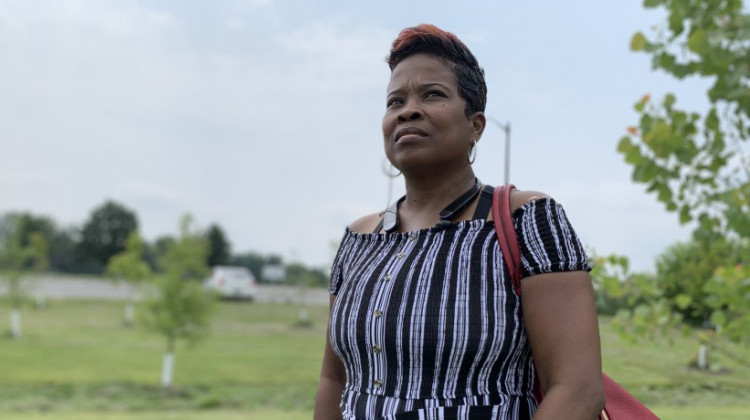
Latisha Bryant, 48, was diagnosed sickle cell anemia as a baby. Over the past 20 years she has needed blood transfusions a few times a year.
Farah Yousry/Side Effects Public MediaLatisha Bryant’s friends know her as the life of the party, the fashionista who is obsessed with shoes.
At 48, she has a pink ombre pixie hair cut. She is bedazzled with hoop earrings and charm bracelets on her left wrist. On her right wrist, however, she wears a hospital bracelet.
“I have sickle cell anemia. I was diagnosed at age one and a half,” Bryant said.
This means her red blood cells are misshapen and more likely to clot. She's prone to serious conditions such as severe joint pain, strokes and organ failure, so Bryant needs blood transfusions every four to six months.
“But sometimes it's hard finding a match for me,” she said. At times, she has waited three days for the treatment.
“When you are already hurting and in pain, that makes you uneasy," she said. "You don't want to...have a situation where you can't get blood, knowing that you will be sicker and sicker,” Bryant said.
Bryant does not have a blood match in Indiana, mainly because she is African American.
There is a shortage in African American blood donors. In fact, only 3% of blood donors are African American, according to the Red Cross. That’s a problem for patients like Bryant.
When it comes to blood, race matters
Blood type — A, B, O, or AB — is not all that matters in blood transfusions. The combination of antigens, or proteins and sugars present on the surface of blood cells, varies from person to person. A match is more likely to be found between people of the same race and ethnicity.
“In patients who receive multiple blood transfusions, it’s really important to match those as exactly as we can,” said Kimber Blackwell, a physician assistant at the Indiana Hemophilia and Thrombosis Center.
When a person receives multiple blood transfusions, their body detects the small differences between its red blood cells and the donor’s. This can lead to a reaction and the development of antibodies, which makes future blood transfusions more difficult.
Blackwell said the center has several patients who don’t have matches in Indiana.
“When I see them get admitted I get nervous,” she said. "I know if this person needs blood, it will take us two days to get blood from a blood bank out of state to match up with them — and two days can be too long."
Racist history of blood donation
This shortage in African American donors is due in part to lack of awareness. But mistrust of the medical establishment also runs deep, according to Amrita Myers, associate professor of history and gender studies at Indiana University Bloomington.
She points to prominent incidents like the Tuskegee experiment, in which the U.S. government studied syphilis in Black men without their informed consent — and without offering treatment. Blood donation and banking are also tainted with a racist past, Myers said.
“Dr. Charles Drew, who is African American, helped to pioneer the techniques of banking blood plasma that laid the foundation for the Red Cross,” Myers said. “Still, there were people who didn't want a white person's donated blood going into a black person's body and vice versa...Banked blood was being kept segregated.”
Black Americans were turned away from donating blood after Pearl Harbor. And during World War II, blood from Black donors was labeled “Negro blood” and offered only to Black soldiers during World War II — because of discrimination, not science. Myers said this kind of discrimination is part of the collective memory of the community and have played some role in where things stand today.
“I think [this history] is very much orally passed down within communities. These are oral traditions,” Myers said. “People talk about what happened to their grandparents or their great grandparents or to their aunts.”
Aware of this gap, some blood centers are reaching out to the community to raise awareness and build trust. For instance, the Versiti Blood Center of Indiana set up a booth at this year's Indiana Black Expo, an annual event that includes
free medical services. Versiti Blood Center of Indiana

Adam Richardson, 47, donated blood there. He doesn’t donate often, but he saw that the booth was nearly empty except for one other person: a young caucasian man.
“I felt bad they may not be getting enough people and I was like, 'Why not donate and be one more person who can help out?'” he said as his blood filled a half-liter bag.
“This will save three people’s lives,” the nurse told him. Richardson’s calm face lit up with a smile. Needles scare him, but he was assured his impromptu decision was worth it.
 DONATE
DONATE






 Support WFYI. We can't do it without you.
Support WFYI. We can't do it without you.